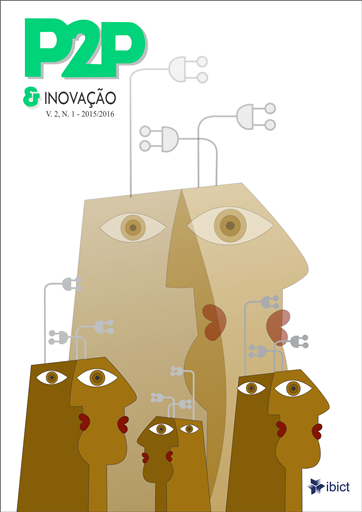CAN CAPITALISM REFORM ITSELF AND MOVE TOWARDS A P2P SOCIETY?
DOI:
https://doi.org/10.21721/p2p.2015v2n1.p6-24Resumo
Abstract
The first Dutch book on P2P “Save the World” by Michel Bauwens had a good reception in Flanders. Even for the critics, the emerging way of ‘getting things done’ through global cooperation on “what is light” and re-localisation of “what is heavy” is making a lot of sense and is indeed the way to go. In this article, we examine two criticisms of the book: the feasibility of an unconditional basic income within the present system and the possibility to move gradually to a P2P society without “overthrowing” capitalism. Apart from the “low road” to peer-to-peer (after an economic collapse) and “the high road to peer-to-peer” (through neo-Keynesianism) a third way could open up, based on a reformed partner state facilitating peer production. Our conclusion is that under the present circumstances, with exponentially growing bottom-up initiatives, open source alternatives and the Internet as a new means of production, value creation and distribution, past failed experiences of ‘socialism in one country’ could today have more chances of succeeding on condition that a progressive government arms itself with a commons transitional plan. Such a transitional government would undoubtedly face many difficulties, but it would at least open the horizon for a better future. And it would certainly enjoy a wave of solidarity throughout the world.
PODE O CAPITALISMO REFORMAR A SI PRÓPRIO E SE ENCAMINHAR PARA UMA SOCIEDADE P2P?
Resumo
O primeiro livro holandês sobre P2P “Save the World” de Michel Bauwens teve boa recepção em Flandres. Mesmo para os críticos, a nova forma de “conseguir fazer as coisas” através da cooperação sobre “o que é leve” e a relocalização de “o que é pesado” faz muito sentido e é, sem dúvida, o caminho a seguir. Neste artigo, analisamos duas críticas feitas ao livro: a viabilidade de renda básica incondicional dentro do sistema presente e a possibilidade de mudar gradualmente para uma sociedade P2P sem “derrubar” o Capitalismo.
Além de uma “low road to peer-to-peer” (depois de um colapso econômico) e “the high road to peer-to-peer” (através do neo-keynesianismo) uma terceira via poderia ser aberta, baseada num estado parceiro reformado que facilitasse a produção do tipo “peer”. Concluímos assim que nas circunstâncias presentes, com iniciativas “bottom-up” crescendo exponencialmente, alternativas de código aberto e da Internet como novo meio de produção, criação e distribuição de valores, experiências falidas de 'socialismo em um só país' no passado poderiam agora ter mais chances de sucesso sob a condição de que um governo progressista se arme com um plano de transição dos comuns. Tal governo de transição poderia sem dúvida enfrentar muitas dificuldades, mas pelo menos abriria os horizontes para um futuro melhor. E certamente gozaria de uma onda de solidariedade no mundo inteiro.
Downloads
Downloads
Publicado
Edição
Seção
Licença
A revista é publicada sob a licença Creative Commons - Atribuição - Uso Não Comercial - Partilha nos Mesmos Termos 4.0 Internacional.
O trabalho publicado é considerado colaboração e, portanto, o autor não receberá qualquer remuneração para tal, bem como nada lhe será cobrado em troca para a publicação.
Os textos são de responsabilidade de seus autores.
É permitida a reprodução total ou parcial dos textos da revista, desde que citada a fonte.














